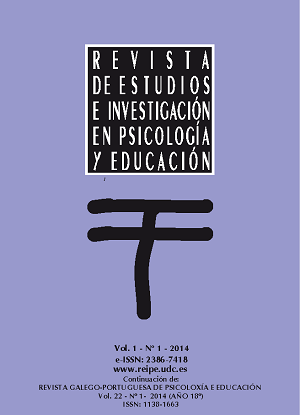Relación entre actitudes y acciones de aprendizaje de los estudiantes universitarios || Connection between attitudes towards studies and learning actions among university students
Contido principal do artigo
DOI:
https://doi.org/10.17979/reipe.2014.1.1.17Resumo
En este artículo se presentan los resultados de una investigación que tiene como objetivo analizar los factores que influyen en el aprendizaje de los estudiantes universitarios. En el marco del proceso de Bolonia y los cambios docentes que éste ha comportado se quiere constatar si realmente el paradigma de enseñanza/aprendizaje centrado en el estudiante ha implicado un aumento del aprendizaje profundo. A partir de un cuestionario contestado por 857 estudiantes de 10 titulaciones de 4 universidades públicas de la Región Metropolitana de Barcelona, se analiza la relación entre motivación de elección de estudios, concepciones de aprendizaje y acciones de aprendizaje, y como estas últimas pueden estar condicionadas por el contexto educativo de las asignaturas. Se concluye que las acciones de aprendizaje están influidas tanto por el contexto como por la orientación profesional de los estudios. Así, los estudiantes llevan a cabo acciones más profundas en las asignaturas caracterizadas por la metodología impulsada con Bolonia, aunque es más beneficioso para un tipo de actitudes hacia el estudio que para otras.
Downloads
Detalles do artigo
Referências
Ajzen, I. (2012). The theory of planned behavior. En P. A. M. Lange, A. W. Kruglanski & E. T. Higgins (Eds.), Handbook of theories of social psychology (Vol. 1, pp. 438-459). London, UK: Sage.
Ariño, A. & Llopis, R. (2011). ¿Universidad sin clases? Condiciones de vida de los estudiantes universitarios en España (Eurostudent IV). Madrid: Ministerio de Educación, Cultura y Deporte.
Bernstein, B. (1971). Class, Codes and Control. London: Routledge & Kegan Paul.
Biggs, J. (1979). Individual differences in study processes and the Quality of Learning Outcomes. Higher Education, 8(4), 381–394. doi:10.1007/BF01680526
Biggs, J. (1993). What do inventories of students’ learning processes really measure? A theoretical review and clarification. British Journal of Educational Psychology, 63(1), 3–19. http://dx.doi.org/10.1111/j.2044-8279.1993.tb01038.x
Biggs, J., Kember, D., & Leung, D. Y. P. (2001). The revised two-factor Study Process Questionnaire: R-SPQ-2F. British Journal of Educational Psychology, 71(1), 133–149. http://dx.doi.org/10.1348/000709901158433
Boudon, R. (1983). La desigualdad de oportunidades. La movilidad social en las sociedades industriales. Barcelona: Laia.
Elias, M. (2011). Valoració dels estudiants universitaris sobre la incorporació de la Universitat Autònoma de Barcelona a l’Espai Europeu d’Educació Superior. Papers. Revista de Sociologia, 96 (4), 1263-1282. http://papers.uab.cat/article/view/v96-n4-elias
Elias, M.; Masjuan , J.M., & Sanchez, A. (2012) .Signs of reengagement? Changing in teaching methodology at Spanish universities as a result of the Bologna Process. En Vukasovic, M., P. Maassen, M. Nerland, R. Pinheiro, B.Stensaker & A. Vabø (eds.) Effects of higher education reforms: Change dynamics. Rotterdam: Sense Publishers.
Entwistle N.J. & Ramsden P. (1983). Understanding Student Learning. London: Croom Helm.
Entwistle, N.J. & McCune, V. (2004). The Conceptual Bases of Study Strategy Inventories. Educational Psychology Review, 16(4), 325–345. http://dx.doi.org/10.1007/s10648-004-0003-0
Entwistle, N.J. (1988). Styles of learning and teaching. London: David Fulton Publishers.
Fernández Enguita, M. (1988). El rechazo escolar: ¿alternativa o trampa social? Política y Sociedad, 1. http://revistas.ucm.es/index.php/POSO/article/viewFile/POSO8888110023A/30682
Heikkilä, A., & Lonka, K. (2006). Studying in higher education: students’ approaches to learning, self regulation, and cognitive strategies. Studies in Higher Education, 31(1), 99–117. http://dx.doi.org/10.1080/03075070500392433
Hernández Pina, F., García Sanz, M. P., Martínez Clares, P., Hervás Avilés, R. M., & Maquilón Sánchez, J. (2002). Consistencia entre motivos y estrategias de aprendizaje en estudiantes universitarios. Revista de Investigación Educativa, 2 (2), http://dx.doi.org/10.6018/99031
Lonka, K., Olkinuora, E. & Mäkinen, J. (2004). Aspects and Prospects of Measuring Studying and Learning in Higher Education. Educational Psychology Review, 16(4), 301–323. http://dx.doi.org/10.1007/s10648-004-0002-1
Machado, M., Brites, R., Magalhaes, A. & Sá, M. (2011). Satisfaction with Higher Education: critical data for student development. European Journal of Education, 46(3), 415–432. http://dx.doi.org/10.1111/j.1465-3435.2011.01489.x
Marton, F. & Säljö, R. (1976). On qualitative differences in learning: I-Outcome and process. British Journal of Educational Psychology, 46(1), 4–11. http://dx.doi.org/10.1111/j.2044-8279.1976.tb02980.x
Masjuan, J.M. & Troiano, H. (2009). University students’ success: A psycho-sociological approach. Higher Education, 58(1), 15–28. http://dx.doi.org/10.1007/s10734-008-9178-5
Meyer, J. H. F., & Shanahan, M. P. (2003). Dissonant Forms of “Memorising” and “Repetition.” Studies in Higher Education, 28(1), 5–20. http://dx.doi.org/10.1080/03075070309305
Padgett, R. D., Johnson, M. P., & Pascarella, E. T. (2012). First-Generation Undergraduate Students and the Impacts of the First Year of College: Additional Evidence. Journal of College Student Development, 53(2), 243–266. http://dx.doi.org/10.1353/csd.2012.0032
Pintrich, P. R. (2004). A Conceptual Framework for Assessing Motivation and Self-Regulated Learning in College Students. Educational Psychology Review, 16(4), 385–407. http://dx.doi.org/10.1007/s10648-004-0006-x
Prosser, M. & Trigwell, K. (1999). Understanding learning and teaching. Buckingham: Society for Research into Higher Education and Open University Press.
Rué, J. (2007). Enseñar en la Universidad. Madrid: Narcea.
Schmeck, R.R. (ed) (1988). Learning strategies and learning styles. New York: Plenum Press.
Trigwell, K., & Ashwin, P. (2006). An Exploratory Study of Situated Conceptions of Learning and Learning Environments. Higher Education, 51(2), 243–258. http://dx.doi.org/10.1007/s10734-004-6387-4
Troiano, H, Masjuan, J.M., & Elias, M. (2010). La recontextualización de las políticas de incorporación al Espacio Europeo de Educación Superior: Un estudio de caso. Revista de Educación, 351, 283-310. http://www.revistaeducacion.mec.es/re351_12.html
Troiano, H., & Elias, M. (2013). University access and after: explaining the social composition of degree programmes and the contrasting expectations of students. Higher Education. http://dx.doi.org/10.1007/s10734-013-9670-4
Troiano, H. (2005). Consistencia y orientación del perfil profesional, percepción del mercado laboral y reacciones previstas ante posibles dificultades de inserción. Papers: Revista de Sociología, 76(76), 167–197. http://dx.doi.org/10.5565/rev/papers/v76n0.975
Valle, A., González, R., Núñez, J.C., Suárez, J.M. Piñeiro, I. & Rodríguez, S. (2000). Enfoques de aprendizaje en estudiantes universitarios. Psicothema, 12 (3), 368-375. http://www.psicothema.com/pdf/344.pdf
Vermunt, J. D., & Minnaert, A. (2003). Dissonance in Student Learning Patterns: When to revise theory? Studies in Higher Education, 28(1), 49–61. http://dx.doi.org/10.1080/03075070309301
Vermunt, J. D., & Vermetten, Y. J. (2004). Patterns in Student Learning: Relationships Between Learning Strategies, Conceptions of Learning, and Learning Orientations. Educational Psychology Review, 16(4), 359–384. http://dx.doi.org/10.1007/s10648-004-0005-y
Zeegers, P. (2002). A Revision of the Biggs’ Study Process Questionnaire (R-SPQ). Higher Education Research & Development, 21(1), 73–92.


